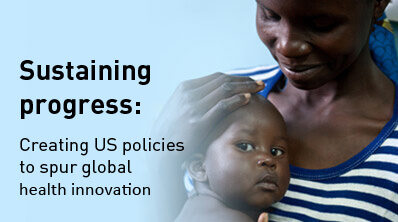Kim LufkinGHTC
Kim Lufkin is a communications officer at GHTC.
Kim Lufkin, GHTC’s communications officer, writes about the coalition’s upcoming third annual policy report. The report will be launched today at a Capitol Hill briefing.
Today, the GHTC will release our third annual policy report. This year’s report will continue the tradition for which we’ve become known in the world of global health research and product development—releasing recommendations for how US policymakers can continue to advance innovation and save lives around the world. The recommendations are backed by the collective voice of our strong membership of nearly 40 nonprofit groups working to advance new vaccines, drugs, diagnostics, and other products that change the course of global public health.

When I began the process of writing the report back in December, I initially struggled with how to make this year’s report unique. I soon realized that I didn’t need to worry on this front, as there have been several exciting research breakthroughs—such as new results from the RTS,S malaria vaccine trials and using HIV treatment as prevention—in the past year. The past 12 months have also seen some notable achievements in the realm of US policies for global health innovation. The report celebrates these successes, and urges US policymakers to maintain this recent momentum:
"In recent years, the global public health landscape has seen incredible progress. Scientific leadership and a commitment to research have led to the development of game-changing innovations—including new vaccines, drugs, and diagnostic products—that are transforming global public health. Other groundbreaking health tools are closer than ever before, like the first-ever malaria vaccine,new HIV prevention options,desperately needed tuberculosis (TB) therapies,and drugs to treat neglected tropical diseases (NTDs) that affect the poorest of the poor. … US investments in global health research can produce real results, and the nation must persist in our efforts to develop the next generation of lifesaving health products.”
On a more somber note, the report recognizes that the United States is facing severe economic constraints. The tight budgetary times have already impacted programs and funding for global health and research:
“Today’s budget constraints mean that even the most essential programs are at risk, and over the past year, Congress has reduced funding for foreign affairs and international aid programming. Amidst these drastic cuts to broader international aid efforts, some global health and R&D [research and development] programs have seen slight increases or flat funding levels. However, these increases are not enough to make up for the huge disparity in current funding levels for global health R&D and what is actually needed to fully fund these lifesaving efforts. While support for some global health and R&D programs has modestly increased or remained flat-funded, support for other global health R&D programs—including funding for some key product development partnerships—has been severely cut.”
It would be an incredible loss if widespread cuts in global health and research were to take place just as science is on the cusp of remarkable breakthroughs for new products. By following the recommendations in the GHTC’s third annual policy report, US policymakers can help take the next generation of lifesaving global health products over the research finish line. Even in this constrained fiscal environment, US leaders cannot lose sight of the end goal—saving lives worldwide.
You can read the online version of the GHTC’s third annual policy report on our website.